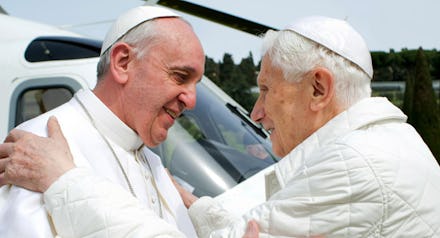One Of These Popes is Not Like the Others

Uniquely positioned as the most powerful and recognizable, the pope has about 1 billion followers. Caught between the spiritual and terrestrial, the pope has always had significant leadership over the lives of believers. According to Twitter, Pope Francis is no exception. The rapid rise in his popularity likely stems not only from the dramatic abdication of Pope Benedict XVI, but also from the new surge in energy he brings to the Chair of Saint Peter.
The Italians say, "After a fat pope, a lean pope." Benedict was a formal man who rose through the Vatican's ranks. Named Prefect of the Second Vatican Council, the man is a preeminent theologian. We saw stark contrasts between his doctrines and those of John Paul II, but his tenure was short lived. Francis must now lead the Church, and in doing so, he's radically changing the politics of his predecessors.
During the Papal conclave of October 1978, it was clear that the Cold War and the Eastern Bloc would be the first major concerns of any newly elected pope. Born in Poland under the tyranny of the Soviets, John Paul II was a natural enemy of communism, going so far as to help bring about the fall of the Berlin Wall. He made international waves after flying to South America to chastise ministries. He banned communism throughout the church, specifically condemning the liberation theologies Francis would later embrace. Francis understands the poor in ways John Paul II seems to have not.
John Paul II wasn't an elitist — far from it. Moreover, Benedict XVI seemed more concerned with the metaphysics of the Church than the tangible realities facing its ministries. From the outset, Jorge Mario Bergoglio declared his papacy would work towards major issues and chose the name Francis (the first ever) to signify his support for the poor and the new direction of the Church. Choosing a silver ring and plain vestments, he publicly signalled that he wanted to lead a "poor church." Already, his attacks of capitalism have redefined the precedents set by John Paul II not long ago.
This changing of the guard not only marks another clash between religion and capitalism, but also an era when a papacy will be defined by how theology inspires its politics rather than historic catechists concerns. Francis understands the world differently than his last two predecessors. One was concerned with metaphysical doctrines that just aren't Francis' chief concern, and John Paul II took the politics of the church in a whole new generation.